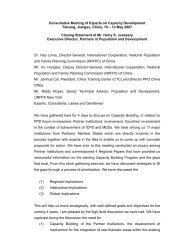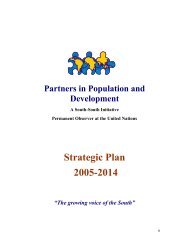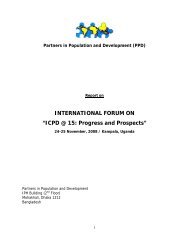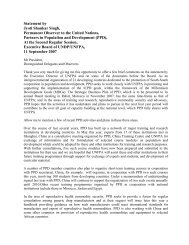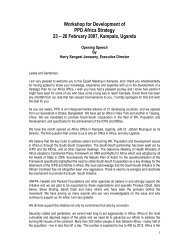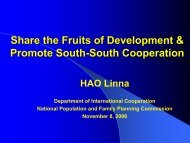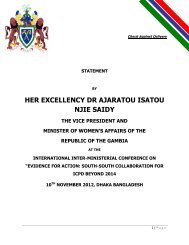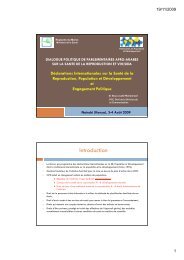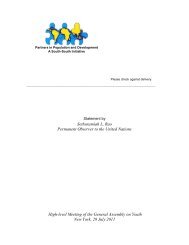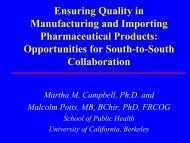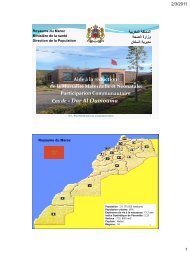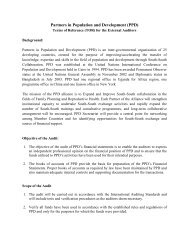Annual Report 2011 - Partners in Population and Development
Annual Report 2011 - Partners in Population and Development
Annual Report 2011 - Partners in Population and Development
Create successful ePaper yourself
Turn your PDF publications into a flip-book with our unique Google optimized e-Paper software.
<strong>2011</strong>ANNUALREPORT<strong>Partners</strong><strong>in</strong><strong>Population</strong><strong>and</strong><strong>Development</strong>(PPD)AnInter-governmentalOrganizationForPromot<strong>in</strong>gSouth-SouthCooperation
<strong>Partners</strong> <strong>in</strong> <strong>Population</strong> <strong>and</strong> <strong>Development</strong> (PPD) is an Intergovernmentalalliance of 25 develop<strong>in</strong>g countries account<strong>in</strong>g for57% of the world population. PPD was <strong>in</strong>itiated dur<strong>in</strong>g theInternational Conference on <strong>Population</strong> <strong>and</strong> <strong>Development</strong> (ICPD)held <strong>in</strong> Cairo <strong>in</strong> 1994 to exp<strong>and</strong> <strong>and</strong> strengthen South-Southcollaboration between <strong>and</strong> among the develop<strong>in</strong>g countries <strong>in</strong> thefield of reproductive health, population <strong>and</strong> development. Thealliance embraced the concept of South-South collaboration toenable its members <strong>and</strong> other develop<strong>in</strong>g countries to share theirknowledge, experiences, <strong>and</strong> expertise <strong>and</strong> best practices to ensuresusta<strong>in</strong>able development <strong>and</strong> improve the quality of life throughpopulation, development <strong>and</strong> reproductive health programmes. Theconcept received further stimulus <strong>in</strong> the Program of Action adoptedby 179 Governments at the ICPD <strong>in</strong> Cairo <strong>in</strong> 1994, which states that:“…..more attention should be given to South-South Cooperation aswell as to new ways of mobiliz<strong>in</strong>g private contributions, particularly<strong>in</strong> partnership with nongovernmental organizations. The<strong>in</strong>ternational community should urge the donor agencies to improve<strong>and</strong> modify their fund<strong>in</strong>g procedures <strong>in</strong> order to facilitate <strong>and</strong> givehigh priority to support<strong>in</strong>g direct South-South collaborationarrangements. ….South-South Cooperation at all levels is animportant <strong>in</strong>strument of development.<strong>Annual</strong> <strong>Report</strong> <strong>2011</strong> | i
Vision of PPDAn Intergovernmental Alliance lead<strong>in</strong>g the promotion of South-SouthCooperation towards atta<strong>in</strong>ment of the global population <strong>and</strong>Reproductive Health agenda for susta<strong>in</strong>able development.Mission of PPDPPD an Intergovernmental Alliance of develop<strong>in</strong>g countries iscommitted to improv<strong>in</strong>g the quality of life of people throughsusta<strong>in</strong>ed advocacy, capacity build<strong>in</strong>g, network<strong>in</strong>g, knowledgeshar<strong>in</strong>g <strong>and</strong> management <strong>and</strong> transfer of technology <strong>in</strong> the field ofreproductive health, population <strong>and</strong> development with<strong>in</strong> theframework of South-South Cooperation.<strong>Annual</strong> <strong>Report</strong> <strong>2011</strong> | ii
Acronyms <strong>and</strong> Abbreviations 02Message from the Chair 03Forward 05Highlights of <strong>2011</strong> 07Our <strong>Partners</strong> 09Our Work 14Africa Regional Office (ARO) 15Background 15Shar<strong>in</strong>g experiences <strong>and</strong> good practices 16Network<strong>in</strong>g <strong>and</strong> build<strong>in</strong>g partnership 17Policy Dialogue 19Ch<strong>in</strong>a Programme Office (CPO) 20Background 20Capacity Build<strong>in</strong>g <strong>and</strong> South-South Cooperation 21Strengthened <strong>Partners</strong>hips 23New York Office (NYO) 24Background 24Represented PPD at the UN General Assembly / its committees……….<strong>and</strong> other UN bodies: 25Liaison with the Permanent Missions of PPD member countries………<strong>and</strong> other UN members <strong>and</strong> senior officials of UN Organizations 25Our Commitments towards Reproductive Health 27Our work for Capacity Build<strong>in</strong>g 30Our Commitment towards South-South Cooperation 32Governance 37Organizational Capacity Build<strong>in</strong>g 39<strong>Annual</strong> <strong>Report</strong> <strong>2011</strong> | 1
AFPAIDSAROASRHBMACARMMACDCCSODFIDDGFPEARHNFPGOPFPHIVICDDR, BICPDICTIIPSIPACJAPMPoAMDGMoHMoHFWMSHNIHFWNPC/TSNTFNGONPFPCNSSSSCPCCPIPoAPPDPRSPRHRHCSRHSCSBPSRHSRHRS-SSSCSSWGUNUNDPUNFPAWHOZNFPCAdvance Family Plann<strong>in</strong>gAcquired Immune Deficiency SyndromeAfrica Regional OfficeAdolescent Sexual <strong>and</strong> Reproductive HealthBritish Medical AssociationCampaign on the Accelerated Reduction of Maternal Mortality <strong>in</strong> AfricaCairo Demographic CentreCivil Society OrganizationDepartment for International <strong>Development</strong>Directorate General Family Plann<strong>in</strong>gEast Africa Reproductive Health NetworkFamily Plann<strong>in</strong>gGeneral Office for <strong>Population</strong> <strong>and</strong> Family Plann<strong>in</strong>gHuman Immune deficiency VirusInternational Centre for Diarrhoeal Disease Research, BangladeshInternational Conference of <strong>Population</strong> <strong>and</strong> <strong>Development</strong>Information Communication TechnologyInternational Institute for <strong>Population</strong> SciencesInternational Programme Advisory CommitteeJo<strong>in</strong>t Action PlanMaputo Plan of ActionMillennium <strong>Development</strong> GoalM<strong>in</strong>istry of HealthM<strong>in</strong>istry of Health <strong>and</strong> Family WelfareManagement Sciences for HealthNational Institute of Health <strong>and</strong> Family WelfareNational <strong>Population</strong> Council/Technical SecretariatTask ForceNon-Governmental OrganizationNational <strong>Population</strong> <strong>and</strong> Family Plann<strong>in</strong>g CommissionNational Support Structure for South-South CooperationPartner Country Coord<strong>in</strong>atorPartner InstitutionsProgramme of Action<strong>Partners</strong> <strong>in</strong> <strong>Population</strong> <strong>and</strong> <strong>Development</strong>Poverty Reduction Strategy PapersReproductive HealthReproductive Health Commodity SecurityReproductive Health Supplies CoalitionStrategic Bus<strong>in</strong>ess PlanReproductive HealthSexual <strong>and</strong> Reproductive Health <strong>and</strong> RightsSouth-SouthSouth-South CooperationSystems Strengthen<strong>in</strong>g Work<strong>in</strong>g GroupUnited NationsUnited Nations <strong>Development</strong> ProgramUnited Nations <strong>Population</strong> FundWorld Health OrganizationZimbabwe‘s National Family Plann<strong>in</strong>g Council<strong>Annual</strong> <strong>Report</strong> <strong>2011</strong> | 2
common good. Thank you for be<strong>in</strong>g part of this great endeavour to br<strong>in</strong>g <strong>in</strong>novative healthsolutions to the least fortunate among us.I take the opportunity to thank the Executive Director of PPD <strong>and</strong> all the staff at theSecretariat, <strong>in</strong> Ug<strong>and</strong>a, Ch<strong>in</strong>a <strong>and</strong> New York offices for their very hard work <strong>and</strong> wish themplenty of success.S<strong>in</strong>cerely,H.E. Mr. Ghulam Nabi AzadChair PPD BoardUnion M<strong>in</strong>ister of Health <strong>and</strong> Family WelfareGovernment of India<strong>Annual</strong> <strong>Report</strong> <strong>2011</strong> | 4
I s<strong>in</strong>cerely thank the Board of PPD, donor communities, PPD Executive Committeemembers, <strong>Partners</strong> Country Coord<strong>in</strong>ators, Partner Institutes for their valued support <strong>and</strong>guidance. I am also grateful to PPD staff of the Secretariat, Africa Regional Office, Ch<strong>in</strong>aProgram office <strong>and</strong> New York office for all the hard work.As we embark on the implementation of the new Strategic Bus<strong>in</strong>ess Plan <strong>in</strong> 2012, I see anew light of hope for a more concerted action to address global concerns <strong>and</strong> challenges.Thank you aga<strong>in</strong> for trust<strong>in</strong>g PPD as an <strong>in</strong>tergovernmental organization for South- SouthCooperation. I am confident that PPD is poised to build on its achievements <strong>in</strong> shar<strong>in</strong>gSouth–South experiences <strong>in</strong> the implementation of the ICPD PoA beyond 2014 <strong>and</strong> <strong>in</strong> thecontext of MDGs.Thank youDr. Joe ThomasExecutive Director<strong>Partners</strong> <strong>in</strong> <strong>Population</strong> <strong>and</strong> <strong>Development</strong> (PPD)<strong>Annual</strong> <strong>Report</strong> <strong>2011</strong> | 6
31 January, <strong>2011</strong>Breakfast Meet<strong>in</strong>g with Member Counties’ UNRepresentativesNew York, USA — PPD’s liaison office to the UnitedNations (UN) <strong>and</strong> the permanent mission ofBangladesh to the UN organized a breakfast meet<strong>in</strong>gfor South-South Cooperation at the Bangladeshmission, <strong>in</strong> UN. Representatives of several permanentmissions <strong>and</strong> United Nations agencies attended theevent.8-10 February, <strong>2011</strong>The International Conference “<strong>Population</strong>,<strong>Development</strong>, <strong>and</strong> Family Plann<strong>in</strong>g <strong>in</strong>Francophone West Africa: The Urgency forAction”Ouagadougou, Burk<strong>in</strong>a Faso - The RegionalDirector of PPD ARO attended the <strong>in</strong>ternationalconference on “<strong>Population</strong>, <strong>Development</strong>, <strong>and</strong> FamilyPlann<strong>in</strong>g <strong>in</strong> Francophone West Africa: The Urgencyfor Action,” that was held <strong>in</strong> Ouagadougou, Burk<strong>in</strong>aFaso February 8-10, <strong>2011</strong>. The conference broughttogether delegations from eight countries <strong>in</strong> theregion (Ben<strong>in</strong>, Gu<strong>in</strong>ea, Mali, Mauritania, Niger,Senegal, Togo, <strong>and</strong> Burk<strong>in</strong>a) <strong>and</strong> provided a forum foridentify<strong>in</strong>g concrete solutions to meet the need forfamily plann<strong>in</strong>g <strong>in</strong> the region.04 April, <strong>2011</strong>17th Executive Committee Meet<strong>in</strong>gNew Delhi, India — The 17th Executive Committeemeet<strong>in</strong>g of PPD was held <strong>in</strong> Delhi on 2-4 April <strong>2011</strong>.The meet<strong>in</strong>g was organized by PPD <strong>in</strong> collaborationwith the M<strong>in</strong>istry of Health <strong>and</strong> Family Welfare,Government of India.14 April, <strong>2011</strong>Meet<strong>in</strong>g of PPD Stakeholders dur<strong>in</strong>g 44th Sessionof UN-CPDNew York, USA — PPD organized jo<strong>in</strong>tly a breakfastmeet<strong>in</strong>g with the permanent mission of Bangladeshon 14th April <strong>2011</strong> at the premises of the Bangladeshmission <strong>in</strong> New York. The meet<strong>in</strong>g was organized forthe participants from PPD member countries, as wellas for representatives from the permanent missionsof PPD countries located <strong>in</strong> New York. The mission ofBangladesh graciously hosted the PPD meet<strong>in</strong>g.18 May, <strong>2011</strong>Meet<strong>in</strong>g with Viet Nam Board member:Hanoi, Viet Nam - PPD delegation had a meet<strong>in</strong>gwith Dr. Duong Quoc Trong, General Director ofGeneral Office for <strong>Population</strong>-Family Plann<strong>in</strong>g <strong>and</strong>Board member, PPD Board. Over 55 participantsfrom diversified discipl<strong>in</strong>es e.g. high governmentofficials from different departments of m<strong>in</strong>istry ofhealth, representatives from other m<strong>in</strong>istries, UNagencies, NGOs, INGOs, CSOs <strong>and</strong> mass mediaattended the workshop.19 May, <strong>2011</strong>South–South Workshop <strong>in</strong> Viet Nam:Hanoi, Viet Nam - A South – South Cooperationworkshop was held at the International ConferenceCenter, Hanoi, Viet Nam on May 19, <strong>2011</strong>. Theworkshop was jo<strong>in</strong>tly organized by PPD <strong>and</strong> theGovernment of the Socialist Republic of Viet Nam.25-26 May, <strong>2011</strong><strong>Population</strong> Footpr<strong>in</strong>ts SymposiumLondon UK- The Regional Director of PPD ARO, Dr.Jotham Mus<strong>in</strong>guzi, participated <strong>in</strong> The UCL-Leverhulme Trust <strong>Population</strong> Footpr<strong>in</strong>ts GlobalSymposium on human population growth <strong>and</strong> globalcarry<strong>in</strong>g capacity.10 June, <strong>2011</strong>PPD’s participations at the United Nations’ HighlevelMeet<strong>in</strong>g on HIV/AIDS <strong>in</strong> New York- The UNGeneral Assembly ‘s three-day High-level meet<strong>in</strong>g onAIDS, held dur<strong>in</strong>g 8-10 June 2010 at UN headquarters<strong>in</strong> New York. Many members of the PPD Board<strong>in</strong>clud<strong>in</strong>g H.E Ghulam Nabi Azad, the M<strong>in</strong>ister of<strong>Annual</strong> <strong>Report</strong> <strong>2011</strong> | 7
Highlights of <strong>2011</strong>Health <strong>and</strong> Family Welfare of India <strong>and</strong> the Chair ofthe PPD Board attended the meet<strong>in</strong>g.24 June, <strong>2011</strong>18th Executive Committee meet<strong>in</strong>g:Dalian City, Ch<strong>in</strong>a - The 18th Executive CommitteeMeet<strong>in</strong>g of PPD was held on 23-24 June <strong>in</strong> Dalian City,Ch<strong>in</strong>a. The meet<strong>in</strong>g was organized by PPD <strong>in</strong>collaboration with Government of the People’sRepublic of Ch<strong>in</strong>a.31 October, <strong>2011</strong><strong>2011</strong> <strong>Annual</strong> Partner Country Coord<strong>in</strong>ators(PCCs) meet<strong>in</strong>g held <strong>in</strong>Pretoria, South Africa — PPD <strong>and</strong> the Governmentof South Africa jo<strong>in</strong>tly organized the PCC meet<strong>in</strong>g.The objective of the meet<strong>in</strong>g was to review <strong>and</strong>discuss PPD activities <strong>and</strong> capacity build<strong>in</strong>g of themember countries’ focal persons.02 November, <strong>2011</strong>PPD honored Professor Fred SaiPretoria, South Africa —PPD honored ProfessorFred Sai with a lifetime achievement award for hiscont<strong>in</strong>uous effort <strong>in</strong> promot<strong>in</strong>g South-Southcooperation at the <strong>in</strong>ternational conference presidedover by the PPD Chair.3 November, <strong>2011</strong>PPD Board <strong>and</strong> Executive committee meet<strong>in</strong>gPretoria South Africa— PPD organized its 16th<strong>Annual</strong> Board meet<strong>in</strong>g <strong>and</strong> 18th Executive Committeemeet<strong>in</strong>g <strong>in</strong> Pretoria South Africa with remarkableparticipation from its board members. H.E. Mr.Ghulam Nabi Azad, Honorable Union M<strong>in</strong>ister ofHealth <strong>and</strong> Family Welfare of the Government ofIndia <strong>and</strong> Chair of PPD Board presided over theseevents.1-2 November, <strong>2011</strong>International Conference on “<strong>Population</strong>Dynamics, Climate Change <strong>and</strong> susta<strong>in</strong>able<strong>Development</strong>”Pretoria, South Africa — The Government of SouthAfrica <strong>and</strong> PPD organized the InternationalConference on “<strong>Population</strong> Dynamics, Climate Change<strong>and</strong> susta<strong>in</strong>able <strong>Development</strong>”. H. E. Ms. BathabileOlive Dlam<strong>in</strong>i member, PPD Board <strong>and</strong> HonourableM<strong>in</strong>ister for Social <strong>Development</strong>, the Government ofthe Republic of South Africa <strong>in</strong>augurated theconference. The Pretoria Declaration, a key outcomeof the conference was adopted by the participants.1 November, <strong>2011</strong>Launch<strong>in</strong>g of Publication on InnovativeExperiences <strong>in</strong> Address<strong>in</strong>g <strong>Population</strong> <strong>and</strong>Reproductive Health Challenges <strong>in</strong> PPD MemberStatesPretoria, South Africa — PPD launched its latestvolume <strong>in</strong> the Shar<strong>in</strong>g Innovative Experiences bookseries, experiences <strong>in</strong> address<strong>in</strong>g population <strong>and</strong>reproductive health challenges, which documents 10case studies of <strong>in</strong>novative practices <strong>and</strong> successfulapproaches for tackl<strong>in</strong>g various aspects of populationchallenges with the support from UNDP South –South Unit.<strong>Annual</strong> <strong>Report</strong> <strong>2011</strong> | 8
PPD is governed by a Board consist<strong>in</strong>g ma<strong>in</strong>ly of M<strong>in</strong>isters of Health,<strong>Population</strong> <strong>and</strong> Social <strong>Development</strong> from the Member States. The Boardelects the four Executive Committee members for a three year term (Chair,Vice-Chair, Secretary <strong>and</strong> Treasurer) <strong>and</strong> Bangladesh is a permanentmember of the Executive Committee. The Board meets once each year todiscuss the governance, policy, programmatic <strong>and</strong> f<strong>in</strong>ancial issues while theExecutive Committee meets twice between the Board meet<strong>in</strong>gs to provideguidance to <strong>and</strong> evaluate the achievements of the organization. The By-Lawssigned by each member state regulate the governance <strong>and</strong> function<strong>in</strong>g of theorganization.Our BoardBANGLADESHH.E. Prof. A. F. M. Ruhal Haque, MPHonourable M<strong>in</strong>ister, M<strong>in</strong>istry of Health <strong>and</strong> Family Welfare (MOHFW),Government of the People’s Republic of BangladeshBENINH.E. Professeur Dorothée GAZARDHonourable M<strong>in</strong>ister, M<strong>in</strong>istry of Health, Republic of Ben<strong>in</strong>, Ben<strong>in</strong>CHINAH.E. Dr. LI B<strong>in</strong>Honourable M<strong>in</strong>ister, National <strong>Population</strong> <strong>and</strong> Family Plann<strong>in</strong>g Commissionof Ch<strong>in</strong>a (NPFPC), Government of the People’s Republic of Ch<strong>in</strong>aExecutive CommitteeChair: H.E. Mr. Ghulam Nabi Azad,Honorable Union M<strong>in</strong>ister of Health<strong>and</strong> Family Welfare of theGovernment of IndiaVice Chair: H.E. Dr. Li B<strong>in</strong>, M<strong>in</strong>ister ofNational <strong>Population</strong> <strong>and</strong> FamilyPlann<strong>in</strong>g Commission (NPFPC)Government of the People’s Republicof Ch<strong>in</strong>aSecretary: Dr. Boniface OmugaK’Oyugi MBS, CEO of NationalCoord<strong>in</strong>at<strong>in</strong>g Agency for <strong>Population</strong><strong>and</strong> <strong>Development</strong> (NCAPD)Government of KenyaTreasurer: Prof. Habiba BENROMDHANE, President, Director-General National Board for Family<strong>and</strong> <strong>Population</strong>Host Country Board Member:H.E. Prof. Dr. AFM Ruhal Haque,Honorable M<strong>in</strong>ister of Health <strong>and</strong>Family Welfare, Government of thePeople’s Republic of BangladeshEGYPTH.E Prof. Dr. Ashraf Mahmoud Ibrahim HatemHonourable M<strong>in</strong>ister, M<strong>in</strong>istry of health <strong>and</strong> population, Government of the Arab Republic of Egypt<strong>Annual</strong> <strong>Report</strong> <strong>2011</strong> | 9
Our <strong>Partners</strong>ETHIOPIAH.E. Dr. Tedros Adhanom GhebreyesusHonourable M<strong>in</strong>ister, M<strong>in</strong>istry of Health, FederalDemocratic Republic of EthiopiaTHE GAMBIAH.E. Mrs. Isatou Njie-SaidyHonourable Vice President <strong>and</strong> Secretary, State forWomen's Affairs, Government of the GambiaINDIAH.E. Mr. Ghulam Nabi AzadHonourable M<strong>in</strong>ister, Union M<strong>in</strong>istry of Health <strong>and</strong>Family Welfare, Government of IndiaINDONESIAH.E. Dr. Sugiri Syarief, MPAChairperson, National Family Plann<strong>in</strong>g Coord<strong>in</strong>ationBoard (BKKBN), Government of IndonesiaJORDANH.E. Dr. Nayef AI-FayesHonourable M<strong>in</strong>ister, M<strong>in</strong>istry of HealthGovernment of the Hashemite K<strong>in</strong>gdom of JordanKENYADr. Boniface O. K’Oyugi, MBSCEO, National Coord<strong>in</strong>at<strong>in</strong>g Agency for <strong>Population</strong><strong>and</strong> <strong>Development</strong>, KenyaMOROCCOH.E. Madame Yasm<strong>in</strong>a BADDOUM<strong>in</strong>ister of Health, Government of the K<strong>in</strong>gdom ofMoroccoMALIH.E. Mme Diallo Madele<strong>in</strong>e BAHonourable M<strong>in</strong>ister, M<strong>in</strong>istry of HealthGovernment of MaliMEXICOMr. Félix Vélez Fernández VarelaSecretary-General, Consejo Nacional de Población(CONAPO), Secretaría de Gobernación, MexicoNIGERIAH.E. Dr. Shamsudeen UsmanHonourable M<strong>in</strong>ister <strong>and</strong> Deputy ChairmanNational Plann<strong>in</strong>g Commission (NPC)Government of the Federal Republic of NigeriaPAKISTANMr. Javed MahmoodSecretary, Plann<strong>in</strong>g & <strong>Development</strong> DivisionGovernment of PakistanSENEGALH.E. Mr Modou DIAGNE FADAHonourable M<strong>in</strong>ister of Health, Prevention <strong>and</strong> PublicHygiene, M<strong>in</strong>istry of Health, Government of SenegalSOUTH AFRICAH.E. Ms. Bathabile Olive Dlam<strong>in</strong>iHonourable M<strong>in</strong>ister for Social <strong>Development</strong>Government of the Republic of South AfricaTHAILANDDr. Somyos DeerasameeHonourable Director-General, Department of Health,M<strong>in</strong>istry of Public Health, The Royal ThaiGovernmentTUNISIAProf. Habiba BEN ROMDHANEPresident, Director-GeneralNational Board for Family <strong>and</strong> <strong>Population</strong>, TunisiaUGANDAH.E. Mr. Matia KasaijaHonourable M<strong>in</strong>ister of State for Plann<strong>in</strong>gM<strong>in</strong>istry of F<strong>in</strong>ance, Plann<strong>in</strong>g <strong>and</strong> Economic<strong>Development</strong>, Government of the Republic of Ug<strong>and</strong>aVIET NAMDr. Duong Quoc TrongGeneral Director of General Office for<strong>Population</strong>-Family Plann<strong>in</strong>g (GOPFP)Government of the Socialist Republic of Viet Nam<strong>Annual</strong> <strong>Report</strong> <strong>2011</strong> | 10
Our <strong>Partners</strong>YEMENH.E. Dr. Ahmed Ali BourjiSecretary General, Technical Secretariat, National<strong>Population</strong> Council, Council of M<strong>in</strong>istersRepublic of YemenZIMBABWEH.E. Dr. Henry MadzoreraHonourable M<strong>in</strong>isterM<strong>in</strong>istry of Health <strong>and</strong> Child WelfareGovernment of Zimbabwe……………………………………………………...………..…Our Partner Country Coord<strong>in</strong>ators(PCCs)BANGLADESHMr. Md. Zakir Hossa<strong>in</strong>Jo<strong>in</strong>t Secretary (FW & Prog.)M<strong>in</strong>istry of Health <strong>and</strong> Family WelfareGovernment of the People’s Republic of BangladeshTel: (88-02) 716 6695Fax: (88-02) 716 9077Email: jsfwp@mohfw.gov.bd;zhossa<strong>in</strong>1959@gmail.comBENINDr. Saizonou JacquesM<strong>in</strong>istre de la Santé Publique du BÉNINTel: +229-21-34-16-74 / +229-21-34-16-75Fax: 229-21-341672Email: saizonoujacques@yahoo.frCHINAMr. Hu HongtaoDeputy Director-GeneralDepartment of International CooperationNational <strong>Population</strong> <strong>and</strong> Family Plann<strong>in</strong>gCommissionGovernment of the People’s Republic of Ch<strong>in</strong>aTel: (86-10) 6203 0636Fax: (86-10) 6203 0831Email: hongtaohu@126.com; hthu@npfpc.gov.cnEGYPTDr. Atef el ShitanyRapporteur, National <strong>Population</strong> Council (NPC)P.O.B Kornish El Nile - Maadi - Beside El Salam AldolyHospital, CairoTel : +(20-2) 25266066Fax : +(20-2) 25266066Email: npcegypt1@hotmail.com;atefelshitany@gmail.comETHIOPIADr. Tenagne Setargie KebedeProgramme Officer, National Maternal HealthProgrammes, Urban Health Promotion DiseasePrevention Directorate, Federal M<strong>in</strong>istry of Health,Government of the Federal Republic of EthiopiaTel: +251911453309Fax: +251115524549Email: tenagnekbd3@gmail.comTHE GAMBIAMr Saikou JK TrawallyDirector of <strong>Population</strong> AffairsSecretariat of the National <strong>Population</strong> CommissionOffice of the President, State House, BanjulTel: (220) 420 1976, 422 4143, 422 7022, 422 4146Fax: (220) 422 4143E-mail: saikoujk@yahoo.com; pop.sec@qanet.gmGHANAMs. Esther CofieHead, <strong>Population</strong> <strong>and</strong> <strong>Development</strong> UnitNational <strong>Population</strong> Council, GhanaTel: (233-302) 665713 / (233-302) 668944Fax: 233-21-662249E-mail: esthercofie@yahoo.com<strong>Annual</strong> <strong>Report</strong> <strong>2011</strong> | 11
INDIAMs. Anuradha GuptaJo<strong>in</strong>t Secretary, M<strong>in</strong>istry of Health <strong>and</strong> FamilyWelfare, Government of the Republic of IndiaTel: (91-011) 2306 1195Fax: (91-011) 2306 1842Email: anuradha.gupta@nic.<strong>in</strong>;anuradha-gupta@hotmail.comINDONESIAMs. KasmiyatiDeputy of Tra<strong>in</strong><strong>in</strong>g <strong>and</strong> <strong>Development</strong>National Family Plann<strong>in</strong>g Coord<strong>in</strong>at<strong>in</strong>g Board(BKKBN)Tel: (62-21) 801 1882Fax: (62-21) 801 1882Email: kasmiyati_juli@yahoo.co.idKENYAMr. Charles N. OisebeSenior <strong>Population</strong> Programme Officer (South-SouthInitiative), National Council for <strong>Population</strong> <strong>and</strong><strong>Development</strong> (NCPD)Tel: (254-20) 2711 600/1Fax: (254-020) 271 6508Email: coisebe@ncapd-ke.org;oisebe2001@yahoo.comMALIMr. Adama DiarraDirector General, National Solidarity FundM<strong>in</strong>istry of Social <strong>Development</strong> Solidarity <strong>and</strong> Age<strong>in</strong>gPeopleTel: +223 20-227815Fax: +223-20-223-69-16E-mail: ads@datatech.toolnet.org;adama2002@hotmail.com;kignanadama2005@yahoo.frMEXICOMs. María Antonieta UgaldeGeneral Director for <strong>Population</strong>Programs <strong>and</strong> International AffairsMexico's National Council of <strong>Population</strong>Email: maugalde@segob.gob.mxMOROCCODr. LAHLOU KhalidDirector of <strong>Population</strong>, M<strong>in</strong>istry of healthDirection de la populationRabat – K<strong>in</strong>gdom of MoroccoTel: (212-537) 690694 /691285 / 692198Fax: (212-537) 691285 / 691082Email: klahlou@sante.gov.ma;Dr.Khalid.LAHLOU@gmail.com;lacharai@hotmail.comNIGERIAMs. Falilat N AbdulraheemAssistant Director ( Multilateral)International Co-operation DepartmentThe Presidency, National Plann<strong>in</strong>g CommissionTel: +234-8065531308Email : nikeabdul@yahoo.co.ukPAKISTANMr. Abdul WaheedDirector, Plann<strong>in</strong>g <strong>and</strong> Foreign Coord<strong>in</strong>ation<strong>Population</strong> Programme W<strong>in</strong>g of Plann<strong>in</strong>g <strong>and</strong><strong>Development</strong> Division, IslamabadTel: +92-51-924 6111Fax: +92-51-924 6100E-mail: dir_fat@yahoo.comSOUTH AFRICAMr. Jacques van ZuydamChief Director <strong>Population</strong> <strong>and</strong> <strong>Development</strong>Department of Social <strong>Development</strong>, Republic of SouthAfricaTel: (27-12) 312 7961, 317 6500<strong>Annual</strong> <strong>Report</strong> <strong>2011</strong> | 12
Fax: (27-12) 312 7710E-mail: jacques@dsd.gov.za; jacques@socdev.gov.zaTHAILANDDr. Kittipong SaejengDirector, Reproductive Health DivisionDepartment of Health, M<strong>in</strong>istry of Public HealthTel: (66-2) 590 4165, 590 4171Fax: (66-2) 590 4163E-mail: jeng4ever@hotmail.com;south@health.moph.go.thTUNISIAMr. Ben Haj Aissa AdneneDirector, Technical CooperationNational Office of Family <strong>and</strong> <strong>Population</strong> (ONFP)Tel: (216-70) 728931Fax: (216-71) 345 790, 354 967Email: bha.adnene@rns.tn; bhaadnene@yahoo.frUGANDADr. Betty KyadondoHead of Family Health Department<strong>Population</strong> Secretariat (POPSEC)M<strong>in</strong>istry of F<strong>in</strong>ance, Plann<strong>in</strong>g & Economic<strong>Development</strong>Tel: (256 41) 705 400-1Fax: (256 41) 343 116Email: bettykyad@yahoo.comYEMENMr. Abdul-Malik Sharafudd<strong>in</strong>Technical Advisor <strong>and</strong> Director General of Plann<strong>in</strong>g<strong>and</strong> Resource Moblization, Technical Secretariat ofNational <strong>Population</strong> Council (NPC/TS)Council of M<strong>in</strong>isters, Republic of YemenTel: (967-1) 231 528, 231 813Fax: (967-1) 231 215Email: Sharafudd<strong>in</strong>@hotmail.com;sharafudd<strong>in</strong>am@yahoo.com;sharafudd<strong>in</strong>2007@yahoo.comZIMBABWEDr. Munyaradzi MurwiraExecutive DirectorZimbabwe National Family Plann<strong>in</strong>g CouncilTel: (263-4) 620 281-5, +263 4 621909Fax: 263 04 620280E-mail: ed@znfpc.org.zwVIET NAMMr. D<strong>in</strong>h Huy DuongDeputy Director of Personnel Department of GeneralOffice for <strong>Population</strong>-Family Plann<strong>in</strong>g (GOPFP)Government of the Socialist Republic of Viet NamTel: (84 - 4) 22 431 625Fax: (84 - 4) 374 74 993Email: d<strong>in</strong>hhuyduong63@yahoo.co.uk;d<strong>in</strong>hhuyduong63@gmail.com<strong>Annual</strong> <strong>Report</strong> <strong>2011</strong> | 13
OUR WORKPPD has its Secretariat headed by the Executive Director, which is located <strong>in</strong> Dhaka,Bangladesh. It has a Regional Office <strong>in</strong> Kampala, Ug<strong>and</strong>a headed by a Regional Director tocoord<strong>in</strong>ate South-South program activities <strong>in</strong> Africa. It has a Program Office <strong>in</strong> Taicang,Ch<strong>in</strong>a headed by a Director to organize its South-South Capacity <strong>Development</strong> activitiesfor professionals from the member states. In order to represent PPD <strong>in</strong> the UnitedNations, PPD ma<strong>in</strong>ta<strong>in</strong>s a Liaison Office to the UN <strong>in</strong> New York headed by the PPDPermanent Observer to the United Nations. PPD also has a country coord<strong>in</strong>at<strong>in</strong>gmechanism <strong>in</strong>volv<strong>in</strong>g one senior government official <strong>in</strong> each member state known as<strong>Partners</strong> Country Coord<strong>in</strong>ators (PCCs) to coord<strong>in</strong>ate South-South program activities withdifferent sectors with<strong>in</strong> the country, among other member countries <strong>and</strong> with the PPDoffices <strong>and</strong> its affiliates.<strong>Annual</strong> <strong>Report</strong> <strong>Annual</strong> <strong>2011</strong> <strong>Report</strong> | 14 | 14
AFRICA REGIONAL OFFICE (ARO)BackgroundThe 11 th PPD Executive Committee Meet<strong>in</strong>g held <strong>in</strong>April 2006 <strong>in</strong> Ch<strong>in</strong>a, took the decision to open aRegional Africa Office to oversee the sexual <strong>and</strong>reproductive health program <strong>in</strong> Africa while foster<strong>in</strong>gSouth-South Cooperation. In 2007, PPD opened aRegional Office <strong>in</strong> Kampala, Ug<strong>and</strong>a. The PPD AROl<strong>in</strong>ks 14 African countries who are members of PPD.The office works through three strategies:1. Policy dialogue;2. Network<strong>in</strong>g <strong>and</strong> build<strong>in</strong>g strategic partnerships<strong>in</strong> the region; <strong>and</strong>3. Shar<strong>in</strong>g of experiences <strong>and</strong> good practices.<strong>Annual</strong> <strong>Report</strong> | 15
Our Work – Africa Regional OfficeShar<strong>in</strong>g experiences <strong>and</strong> good practices“Lesson learn<strong>in</strong>g” field visit to EthiopiaPPD ARO <strong>in</strong> partnership with the Federal M<strong>in</strong>istry of Health <strong>and</strong> M<strong>in</strong>istry of F<strong>in</strong>ance of Ethiopiaorganized a lesson learn<strong>in</strong>g field visit to Ethiopia’s Health Extension Programme (HEP). The HEP is an<strong>in</strong>novative community based approach to<strong>in</strong>crease access to health <strong>in</strong>formation <strong>and</strong>services. Participants on the field visit weredrawn from Eastern Africa ReproductiveHealth Network (EARHN) membercountries <strong>in</strong>clud<strong>in</strong>g Burundi, Ethiopia,Kenya, Tanzania, Rw<strong>and</strong>a, South Sudan <strong>and</strong>Ug<strong>and</strong>a. This capacity build<strong>in</strong>g programwas part of Advance Family Plann<strong>in</strong>g (AFP)<strong>in</strong>itiative funded by the Bill <strong>and</strong> Mel<strong>in</strong>daGates Institute for <strong>Population</strong> <strong>and</strong>Reproductive Health <strong>and</strong> the David <strong>and</strong>Lucile Packard Foundation. The AFPConsortium is led by the Johns Hopk<strong>in</strong>sUniversity (JHU) Bloomberg School of Public Health <strong>and</strong> Bill & Mel<strong>in</strong>da Gates Institute. <strong>Partners</strong><strong>in</strong>clude the Centre for Communication Programs at JHU, African Women’s <strong>Development</strong> Fund,<strong>Partners</strong> <strong>in</strong> <strong>Population</strong> <strong>and</strong> <strong>Development</strong>, <strong>and</strong> Futures Group International.……………………………………………………………………………………………………………………………………………………………Capacity Build<strong>in</strong>g workshop on “Spitfire advocacystrategies”, <strong>in</strong> Nairobi, KenyaPPD ARO <strong>and</strong> Johns Hopk<strong>in</strong>s BloombergSchool of Public Health, USA jo<strong>in</strong>tlyorganized a tra<strong>in</strong><strong>in</strong>g workshop on theSpitfire Strategies Approach for familyplann<strong>in</strong>g advocacy. The workshop was heldfrom July 19-21, <strong>2011</strong>, at Chester House,Nairobi, Kenya for EARHN focal persons.This activity was a part of the AdvanceFamily Plann<strong>in</strong>g (AFP) <strong>in</strong>itiative aimed atrevitalizes family plann<strong>in</strong>g programsthrough <strong>in</strong>creased <strong>and</strong> more effectivefund<strong>in</strong>g <strong>and</strong> improved policy commitmentsat the local, national <strong>and</strong> global levels.<strong>Annual</strong> <strong>Report</strong> | 16
Our Work – Africa Regional OfficeCapacity build<strong>in</strong>g for presenters on“Sub Saharan Africa Rapid Model”A capacity build<strong>in</strong>g programme on Sub Saharan RAPID Model on advocacy was organized for PPDARO staff on January 5-7, <strong>2011</strong> <strong>in</strong> Kampala, Ug<strong>and</strong>a. The objective of the tra<strong>in</strong><strong>in</strong>g was to build theskills of PPD ARO Staff <strong>in</strong> us<strong>in</strong>g a Sub Saharan RAPID Model to undertake effective advocacy forRH/FP <strong>in</strong> Africa. Dr Tom Goliber of Futures Group International facilitated this event.Network<strong>in</strong>g <strong>and</strong> build<strong>in</strong>g partnershipHealth Policy Project (HPP) OrientationWorkshop, Wash<strong>in</strong>gton, USAMr. Abdelylah Lakssir, International Programme Officer with PPD ARO, attended the HPP orientationworkshop held <strong>in</strong> Wash<strong>in</strong>gton, DC, USA from 22-28 January <strong>2011</strong>. HPP is a five years cooperativeagreement funded by the United States Agency for International <strong>Development</strong> (USAID). It isimplemented by the Futures Group, <strong>in</strong> collaboration with the Centre for <strong>Development</strong> <strong>and</strong><strong>Population</strong> Activities (CEDPA), Futures Institute <strong>and</strong> PPD ARO. The project focuses on reproductivehealth, HIV <strong>and</strong> AIDS, maternal health, <strong>and</strong> health systems strengthen<strong>in</strong>g.……………………………………………………………………………………………………………………………………………………………Packard Foundation Grantees <strong>and</strong> <strong>Partners</strong>Meet<strong>in</strong>g, Addis Ababa, EthiopiaPatrick Mugirwa, Programme Officer with PPDARO attended the Packard Foundation grantees <strong>and</strong>partners meet<strong>in</strong>g which was held from February 1–2, <strong>2011</strong> <strong>in</strong> Addis Ababa, Ethiopia. The purpose ofthe meet<strong>in</strong>g was to share experiences, achievements <strong>and</strong> challenges <strong>in</strong> implement<strong>in</strong>g programmesby the Packard Foundation supported grantees.……………………………………………………………………………………………………………………………………………………………Capacity plus Project OrientationMeet<strong>in</strong>gs, Wash<strong>in</strong>gton D.CPPDARO Programme Officer, Mr. Patrick Mugirwa attended the Capacity Plus Project orientationprogram <strong>in</strong>, Wash<strong>in</strong>gton D.C. This was on <strong>in</strong>vitation by Capacity Plus project management toPPDARO as an associate partner to a 5- year project on Human Resources for Health Systems<strong>Annual</strong> <strong>Report</strong> | 17
Our Work – Africa Regional OfficeStrengthen<strong>in</strong>g. The purpose of the mission was to orient the PPD ARO staff to better underst<strong>and</strong> thework of Capacity Plus. In addition, the mission gave an opportunity to PPDARO <strong>and</strong> the Capacity Plusproject’s Communications Unit to work together <strong>and</strong> develop effective Human Resources for Health(HRH) advocacy messages <strong>and</strong> materials.……………………………………………………………………………………………………………………………………………………………Advance Family Plann<strong>in</strong>g (AFP) <strong>Partners</strong>Meet<strong>in</strong>g, Baltimore, USThree staff from PPD ARO namely Dr. Jotham Mus<strong>in</strong>guzi, Mr. Abdelylah Lakssir <strong>and</strong> Mr. PatrickMugirwa attended AFP <strong>Partners</strong> Meet<strong>in</strong>g <strong>in</strong> Baltimore, US from March 21 – 25. The purpose of themeet<strong>in</strong>g was to share experiences, lessons learned, achievements <strong>and</strong> challenges regard<strong>in</strong>gimplementation of AFP <strong>in</strong>terventions by AFP partners <strong>and</strong> to develop an annual work plan.……………………………………………………………………………………………………………………………………………………………<strong>Partners</strong>hip with the African Union (AU)PPD ARO has become a key partner to the AU <strong>in</strong>advocat<strong>in</strong>g <strong>and</strong> implement<strong>in</strong>g several activities.Most of these activities are around thepromotion <strong>and</strong> implementation of the MaputoPlan of Action (PoA) as a cont<strong>in</strong>ental frameworkof SRHR to help <strong>in</strong> achiev<strong>in</strong>g the ICPD PoA <strong>and</strong>MDGs. The follow<strong>in</strong>g are some of the activitiesthat PPD ARO was <strong>in</strong>volved <strong>in</strong> throughpartnership with AU <strong>in</strong> <strong>2011</strong>:i. Experts meet<strong>in</strong>g on the harmonizationof Maputo PoA with MDG4 <strong>and</strong> 5 <strong>and</strong> Abuja Declaration with MDG6, April 6 - 8, <strong>2011</strong>ii. Fifth Session of African Health M<strong>in</strong>isters Conference (CAMH5), W<strong>in</strong>dhoek, Namibia, April 17– 21, <strong>2011</strong>iii. The Fourth EARHN Coord<strong>in</strong>ation Meet<strong>in</strong>g, April 25 – 30, Kampala, Ug<strong>and</strong>aiv. 8 th Ord<strong>in</strong>ary Session of the African <strong>Population</strong> Commission(APC) 15-16 September <strong>2011</strong>,Addis Ababa, Ethiopiav. Meet<strong>in</strong>g for development of the <strong>in</strong>tegrated Africa Maternal, New born <strong>and</strong> Child Health(MNCH) advocacy strategy <strong>and</strong> guidel<strong>in</strong>es for CSO Engagement for Promotion &Implementation of Maputo PoA.<strong>Annual</strong> <strong>Report</strong> | 18
Our Work – Africa Regional OfficePolicy DialogueMeet<strong>in</strong>g of Ug<strong>and</strong>a’s ParliamentaryForum on MDGsIn May <strong>2011</strong>, PPD ARO facilitated a breakfast meet<strong>in</strong>g<strong>in</strong> Kampala for Ug<strong>and</strong>a’s Parliamentary Forum onMDGs. The purpose of the meet<strong>in</strong>g was to shareprogress <strong>and</strong> challenges to Ug<strong>and</strong>a’s atta<strong>in</strong>ment of theMDGs <strong>and</strong> to agree by consensus on the pert<strong>in</strong>entissues <strong>in</strong> the Strategic Plan for the forum.……………………………………………………………………………………………………………………………………………………………Workshops with Sector Heads <strong>and</strong> technicalpersonnel <strong>in</strong> Mukono <strong>and</strong> Mayuge districts of Ug<strong>and</strong>aPPD ARO <strong>in</strong> partnership with <strong>Population</strong> Secretariat <strong>and</strong> the M<strong>in</strong>istry of Local Government ofUg<strong>and</strong>a organized a series of workshops <strong>in</strong> Mukono <strong>and</strong> Mayuge Districts <strong>in</strong> Ug<strong>and</strong>a. Theseworkshops aimed to help the district officials as well as sub-counties’ technical <strong>and</strong> adm<strong>in</strong>istrativepersonnel to underst<strong>and</strong> the concept of <strong>in</strong>tegrat<strong>in</strong>g <strong>and</strong> prioritiz<strong>in</strong>g family plann<strong>in</strong>g <strong>in</strong> theirdevelopment plans <strong>and</strong> budgets as well as implement it <strong>in</strong> the <strong>2011</strong>/2012 f<strong>in</strong>ancial year. The sectorsrepresented <strong>in</strong> those meet<strong>in</strong>gs <strong>in</strong>cluded; f<strong>in</strong>ance, production, education, health, community services,water, environment, technical <strong>and</strong> works, management support services <strong>and</strong> district plann<strong>in</strong>g unit.……………………………………………………………………………………………………………………………………………………………Reproductive Health Supplies Coalition (RHSC)Conference <strong>and</strong> side meet<strong>in</strong>g for Ch<strong>in</strong>eseMembership <strong>in</strong> RHSCsPPD ARO was represented dur<strong>in</strong>g the RHSC’s Conference <strong>in</strong> Addis Ababa, Ethiopia from 20–24, <strong>2011</strong>.The theme of the conference was “Access for All: Supply<strong>in</strong>g a new decade for reproductive health”.PPD participated <strong>in</strong> the Coalition meet<strong>in</strong>g ma<strong>in</strong>ly as the organizer of Pillar III which was on "Countryownership <strong>in</strong> a globalized world. Beside this, a parallel meet<strong>in</strong>g was conducted by PPD <strong>and</strong>Pathf<strong>in</strong>der International where they discussed about their jo<strong>in</strong>t proposals’ to RHSC to engage Ch<strong>in</strong>aas a potential member of this coalition.<strong>Annual</strong> <strong>Report</strong> | 19
CHINA PROGRAMME OFFICE (CPO)BackgroundWith the support of the People’s Republic of Ch<strong>in</strong>a, <strong>in</strong>2006, PPD opened a Program Office <strong>in</strong> Ch<strong>in</strong>a. TheProgram Office is located <strong>in</strong> the Premises of Ch<strong>in</strong>aTra<strong>in</strong><strong>in</strong>g Centre (CTC) <strong>in</strong> Taicang City. The objective ofthe office is to galvanize resources <strong>and</strong> spearhead aseries of program activities:Through Capacity Build<strong>in</strong>g for the promotionof South-South Cooperation <strong>in</strong> RH, <strong>Population</strong><strong>and</strong> <strong>Development</strong> activities.Facilitates the transfer of RH Commodities <strong>and</strong>Technologies between develop<strong>in</strong>g countries.<strong>Annual</strong> <strong>Report</strong> | 20
Our Work – Ch<strong>in</strong>a Programme OfficeCapacity Build<strong>in</strong>g for South-South CooperationStudy tour for professionals from BangladeshPPD Ch<strong>in</strong>a Program Office <strong>in</strong> collaboration withNanj<strong>in</strong>g Tra<strong>in</strong><strong>in</strong>g Centre organized a study tour forhealth professionals from Bangladesh. TheBangladeshi delegation consisted of eleven FPprogram managers <strong>and</strong> technical service providersfrom Bangladesh Directorate General of FP, local FPdivisions <strong>and</strong> UNFPA Bangladesh office. The studytour provided them first-h<strong>and</strong> experience of Ch<strong>in</strong>a'sFP program <strong>and</strong> MCH system at national <strong>and</strong>community levels.……………………………………………………………………………………………………………………………………………………………Sem<strong>in</strong>ar on Mother <strong>and</strong> Children Health CarePromotion for Anglophone African CountriesPPD Ch<strong>in</strong>a Program office organized a three week long sem<strong>in</strong>ar on Mother <strong>and</strong> Children health carepromotion for Anglophone African countries. This sem<strong>in</strong>ar was sponsored by National <strong>Population</strong><strong>and</strong> Family Plann<strong>in</strong>g Commission (NPFPC) <strong>and</strong> M<strong>in</strong>istry of Commerce (MOFCOM) of Ch<strong>in</strong>a. Six PPDparticipants from Ethiopia, Kenya, Ghana,Nigeria, Ug<strong>and</strong>a <strong>and</strong> South Africa attended thisevent. This was an opportunity for theparticipants to learn from Ch<strong>in</strong>a’s experience<strong>in</strong> promot<strong>in</strong>g MCH care, Ch<strong>in</strong>a’s familyplann<strong>in</strong>g program <strong>and</strong> on challenges to achieveMDGs <strong>and</strong> ICPDs goals. The workshop wasgraced by the presence of H.E. Mrs.Nompumelelo Ntuli-Zuma, first lady of thePeoples’ Republic of South Africa who attendedthe session <strong>and</strong> it is hoped that she wouldbecome a goodwill ambassador <strong>and</strong> advocateof MCH issues.<strong>Annual</strong> <strong>Report</strong> | 21
Our Work – Ch<strong>in</strong>a Programme OfficeSem<strong>in</strong>ar on Mother <strong>and</strong> Children Health CarePromotion for French-speak<strong>in</strong>g African CountriesA sem<strong>in</strong>ar on Mother <strong>and</strong> Children Health carepromotion for Francophone African countrieswas organized by PPD Ch<strong>in</strong>a office from 10- 28July, <strong>2011</strong>. This sem<strong>in</strong>ar brought three PPDparticipants form Ben<strong>in</strong>, South Africa, Mali. Thesem<strong>in</strong>ar was sponsored by MOFCOM <strong>and</strong>NPFPC. Dur<strong>in</strong>g the sem<strong>in</strong>ar, participants madea commitment that they will work tostrengthen policy dialogue <strong>and</strong> technicalcooperation among themselves <strong>and</strong> theirrespective member countries.……………………………………………………………………………………………………………………………………………………………International Sem<strong>in</strong>ar for South-South Cooperationon NGO Capacity Build<strong>in</strong>g <strong>in</strong> <strong>Population</strong><strong>and</strong> Reproductive HealthAn <strong>in</strong>ternational sem<strong>in</strong>ar for South-South Cooperation on NGO capacity build<strong>in</strong>g <strong>in</strong> population <strong>and</strong>reproductive health was organized by PPD Ch<strong>in</strong>a office from 9-10 October <strong>2011</strong>. This event opened aplatform for South-South Cooperation as it was attended by over thirty different stakeholders fromAsia, Africa <strong>and</strong> Lat<strong>in</strong> America.<strong>Annual</strong> <strong>Report</strong> | 22
Our Work – Ch<strong>in</strong>a Programme OfficeStrengthened <strong>Partners</strong>hip<strong>Partners</strong>hip with UNFPA Ch<strong>in</strong>a country ProgramPPD Ch<strong>in</strong>a office is an important partner of UNFPA Ch<strong>in</strong>a regard<strong>in</strong>g South-South Cooperation (SSC).PPD Ch<strong>in</strong>a office was on the lead<strong>in</strong>g Committee for draft<strong>in</strong>g the SSC proposal of the 7th UNFPACountry Program Action Plan (CPAP). The proposal suggested creat<strong>in</strong>g adequate <strong>and</strong> structured<strong>in</strong>stitutional support among the concerned national stakeholders. The proposal also madesuggestions on issues like: facilitat<strong>in</strong>g the capacity build<strong>in</strong>g to national partners <strong>and</strong> encourag<strong>in</strong>gwide participation of public <strong>and</strong> private sectors <strong>in</strong> South-South Cooperation <strong>in</strong> population <strong>and</strong>development.……………………………………………………………………………………………………………………………………………………………Technical <strong>and</strong> Consultative SupportPPD Ch<strong>in</strong>a office provided technical <strong>and</strong> consultative support for different government departments<strong>and</strong> organizations on the follow<strong>in</strong>g issues: 1. <strong>Population</strong> <strong>and</strong> climate change; 2. S<strong>in</strong>o-implant,<strong>in</strong>clud<strong>in</strong>g its overseas registration <strong>and</strong> bulk procurement by <strong>in</strong>ternational donor agencies, WHOprequalification 3. Impacts of decentralization on FP programs <strong>in</strong> Indonesia; 4. <strong>Population</strong> <strong>and</strong> FPprograms <strong>in</strong> Malaysia; 5. Early childhood development; 6. Latest trends on global population <strong>and</strong>development; 7. Government agencies dedicated to population <strong>and</strong> development <strong>in</strong> selectedcountries; 8. United Nations Conference on Susta<strong>in</strong>able <strong>Development</strong> (Rio+20).<strong>Annual</strong> <strong>Report</strong> | 23
NEW YORK OFFICE(NYO)BackgroundPPD was conferred the Permanent Observer status at theUN General Assembly through its resolution No 57/29 <strong>in</strong>November 2002. Accord<strong>in</strong>g to the requirement of UNObservers, PPD ma<strong>in</strong>ta<strong>in</strong>s a liaison office to the UN <strong>in</strong>New York. The role of the office is to -• Provide high-level representation for PPD at themeet<strong>in</strong>gs of the General Assembly, Economic <strong>and</strong>Social Council, UNDP/UNFPA Executive Board<strong>and</strong> other UN organs;• Ma<strong>in</strong>ta<strong>in</strong>s regular liaison with the PermanentMissions of PPD member countries <strong>and</strong> other UNmembers, <strong>and</strong> senior officials of UNorganizations;• Explore the possibility of establish<strong>in</strong>g a UScommittee as a non-profit entity for PPD• Undertakes other external relations activities, asappropriate <strong>and</strong> develop or participate <strong>in</strong>projects, relevant to the work of the PPD.<strong>Annual</strong> <strong>Report</strong> | 24
Our Work – New York OfficeRepresented PPD at the UN General Assembly /its committees <strong>and</strong> other UN bodies:Dur<strong>in</strong>g this period, the PPD UN Observer represented the organization at the 65 th <strong>and</strong> 66 thSession of the General Assembly. PPD was also represented at the various GA High LevelMeet<strong>in</strong>gs :(a) on Prevention <strong>and</strong> Control of Non-Communicable Diseases (b) on Desertification(c) on the Tenth Anniversary of Durban Conference (d) on the High Level General Debate on theRole of Negotiations <strong>in</strong> Settlement of Conflicts. (e) High Level Summit on Youth organized by the65th Session of the General Assembly dur<strong>in</strong>g 25-28 July <strong>2011</strong>. (f) High Level Summit onHIV/AIDS.The Observer gave statements on behalf of PPD <strong>in</strong> the various Commissions of the UnitedNations, <strong>in</strong>clud<strong>in</strong>g, the 49 th session of the Commission on Social development, 55 th session of theCommission on the Status of Women, 44 th session of the Commission on <strong>Population</strong> <strong>and</strong><strong>Development</strong> <strong>and</strong> 19th session of the Commission on Susta<strong>in</strong>able <strong>Development</strong>.The Observer <strong>and</strong> the Executive Director of PPD represented PPD <strong>in</strong> different sessions of UNDP/ UNFPA /UNOPS Executive Board Meet<strong>in</strong>g <strong>and</strong> made statements on behalf of PPD that can beaccessed on the PPD website.Liaison with the Permanent Missions of PPDmember countries <strong>and</strong> other UN members <strong>and</strong>senior officials of UN OrganizationsLiaison <strong>and</strong> External Relations Workwith<strong>in</strong> United NationsThe permanent observer ma<strong>in</strong>ta<strong>in</strong>ed regular liaison with the permanent missions of PPD membercountries, other UN members <strong>and</strong> with senior officials of the UN. In UNFPA, the observer liaisedwith the Deputy Executive Director, Director <strong>and</strong> Deputy Director of technical division to : (a) def<strong>in</strong>ecollaboration areas between PPD <strong>and</strong> UNFPA for <strong>2011</strong> (b) discussed <strong>and</strong> responded to the UNFPAexternal evaluation of PPD activities dur<strong>in</strong>g 2008-2010 (c) submitted <strong>and</strong> followed up on PPDprojects, <strong>in</strong>clud<strong>in</strong>g negotiat<strong>in</strong>g a grant for PPD <strong>in</strong> <strong>2011</strong> for selected PPD activities <strong>and</strong> (d) providedtechnical clarifications to UNFPA on grant related issues <strong>and</strong> the Letter of Underst<strong>and</strong><strong>in</strong>g.The PPD UN Observer office actively collaborated with the UNDP Unit for South-South Cooperationon strengthen<strong>in</strong>g cooperation between the two <strong>in</strong>stitutions <strong>in</strong>clud<strong>in</strong>g the publication <strong>and</strong> launch ofPPD <strong>in</strong>novative practices <strong>in</strong> population <strong>and</strong> reproductive health.<strong>Annual</strong> <strong>Report</strong> | 25
Our Work – New York OfficeAdvocacy <strong>and</strong> facilitat<strong>in</strong>g activities forPPD member countriesThe PPD Permanent UN Observer sensitized PPD member countries about PPD activities <strong>and</strong> onprogram through their missions <strong>in</strong> New York. In <strong>2011</strong>, the Observer’s Office jo<strong>in</strong>tly organized withthe permanent mission of Bangladesh two breakfast meet<strong>in</strong>gs <strong>in</strong> New York for PPD <strong>and</strong> otherdevelop<strong>in</strong>g countries’ mission on South-South cooperation on 31 January <strong>and</strong> 14 April <strong>2011</strong>. Both ofthe events were well attended <strong>and</strong> much appreciated by the PPD member countries. A proposal wasmade by the participants that it should become a regular feature <strong>in</strong> the marg<strong>in</strong>s of the annualsessions of the Commission on <strong>Population</strong> <strong>and</strong> <strong>Development</strong>.Beside this, dur<strong>in</strong>g the General Assembly session on 8-10 June <strong>2011</strong> the observer office alsofacilitated the meet<strong>in</strong>g between H.E the Indian Health M<strong>in</strong>ister, the Chair of the PPD Executive Board<strong>and</strong> H.E the Bangladesh M<strong>in</strong>ister for Health, the permanent member of the PPD Board.……………………………………………………………………………………………………………………………………………………………Yogyakarta Declaration as an UN Document!The United Nations supported PPD as a Permanent Observer to the UN for improvement ofreproductive health, family plann<strong>in</strong>g <strong>and</strong> maternal health <strong>in</strong> the develop<strong>in</strong>g countries through South-South Cooperation. In <strong>2011</strong>, the United Nations issued the “Yogyakarta Declaration” of PPD as anofficial document of the Commission on <strong>Population</strong> <strong>and</strong> <strong>Development</strong> <strong>and</strong> widely dissem<strong>in</strong>ated it <strong>in</strong>all its 6 official languages, namely English, French, Spanish, Russian, Ch<strong>in</strong>ese <strong>and</strong> Arabic. TheYogyakarta Declaration was adopted by the M<strong>in</strong>isters <strong>and</strong> senior government officials of 25 PPDmember together with more than 250 participants <strong>in</strong>clud<strong>in</strong>g <strong>in</strong>ternational experts, representatives ofNGOs, Civil-society, UNFPA <strong>and</strong> WHO at the International Conference on “Promot<strong>in</strong>g Family Plann<strong>in</strong>g<strong>and</strong> Maternal Health for Poverty Alleviation” organized by PPD <strong>and</strong> the Government of Indonesia <strong>in</strong>Yogyakarta, Indonesia on 26 <strong>and</strong> 27 October 2010.The Declaration sets out a number of recommendations for develop<strong>in</strong>g countries <strong>and</strong> other partnersrelated to major issues <strong>and</strong> concerns related to family plann<strong>in</strong>g, maternal health <strong>and</strong> povertyalleviation, f<strong>in</strong>ancial <strong>and</strong> human resources required to improve family plann<strong>in</strong>g <strong>and</strong> maternal health<strong>and</strong> leverag<strong>in</strong>g South-South cooperation for the atta<strong>in</strong>ment of ICPD Goals <strong>and</strong> MDGs. Participants atthe conference expressed firm commitments for the implementation of the Declaration throughreorientation <strong>and</strong> readjustment of their national policies <strong>and</strong> programs. PPD wishes to thank theUnited Nations wholeheartedly for this crucial support <strong>and</strong> looks forward to cont<strong>in</strong>ued support forimprov<strong>in</strong>g lives of the peoples of develop<strong>in</strong>g countries <strong>in</strong> the days to come.<strong>Annual</strong> <strong>Report</strong> | 26
PPD to meet <strong>in</strong>tegrated <strong>and</strong>comprehensive Family Plann<strong>in</strong>gneedsPPD is partner<strong>in</strong>g with a DFID funded ResearchProgram Consortium (RPC) for meet<strong>in</strong>g theUnmet Needs for Family Plann<strong>in</strong>g <strong>and</strong> Improv<strong>in</strong>gAccess to Safe Abortion. The other members <strong>in</strong>the consortium are Africa <strong>Population</strong> <strong>and</strong> HealthResearch Centre, Centre for <strong>Population</strong> Studies,London School of Hygiene <strong>and</strong> Tropical Medic<strong>in</strong>e,International Centre for Diarrheal DiseaseResearch, Bangladesh (ICDDR, B) <strong>and</strong> MarieStopes International. The overall objective of thissix years long program which was approved <strong>in</strong><strong>2011</strong> is to support an evidence-based approachto scal<strong>in</strong>g up access to family plann<strong>in</strong>g (FP) <strong>and</strong>safe abortion through generat<strong>in</strong>g, communicat<strong>in</strong>g<strong>and</strong> build<strong>in</strong>g the capacity of develop<strong>in</strong>g countryprograms to use new knowledge to supportefforts to reduce unmet need for FP <strong>and</strong> safeabortion services.• Dr. Jotham Mus<strong>in</strong>guzi, PPD Africa RegionalDirector <strong>and</strong> Ms. Therese Maye Diouf,International Program Coord<strong>in</strong>ator of PPDparticipated <strong>in</strong> the first Senior ManagementTeam (SMT) meet<strong>in</strong>g of STEP UP project <strong>in</strong>London, UK. The ma<strong>in</strong> objective of themeet<strong>in</strong>g was to develop a work plan with atimel<strong>in</strong>e, def<strong>in</strong>e the responsibilities <strong>and</strong>outputs of the Inception Phase of this project.• The STEP UP consortium organized astakeholders meet<strong>in</strong>g <strong>in</strong> BRAC center Dhakaon 18th April <strong>2011</strong>. The ma<strong>in</strong> objective of thismeet<strong>in</strong>g was to <strong>in</strong>itiate the Consortium’sactivities <strong>in</strong> Bangladesh. The meet<strong>in</strong>g waschaired by Mr. D K Nath <strong>and</strong> the ProjectDirector Mr. Stan Bersta<strong>in</strong> gave an overviewof the project. PPD was represented by twoprogram officers (Dr. Nazrul Islam <strong>and</strong> Dr.Mahbubur Rashid) <strong>in</strong> this meet<strong>in</strong>g.• The Executive Director of PPD Mr. Harry S.Jooseery attended the second meet<strong>in</strong>g of theSenior Management Team (SMT) for the<strong>Annual</strong> <strong>Report</strong> | 27
Our Commitment towards Reproductive HealthResearch Programme Consortium, STEP UP,which was held on May 23–25 <strong>2011</strong> at theGrange White Hall Hotel, London with an aimto identify the research strategy for theproject.• The STEP UP consortium convened a half-daymeet<strong>in</strong>g <strong>in</strong> Nairobi, Kenya on 19th May <strong>2011</strong>to launch the new project. The major themesdiscussed dur<strong>in</strong>g the meet<strong>in</strong>g were around‘strengthen<strong>in</strong>g <strong>and</strong> exp<strong>and</strong><strong>in</strong>g the reach ofexist<strong>in</strong>g RH programmes so that they functionmore effectively <strong>and</strong> efficiently.…………………………………………………………...………Human Rights Based Approach toMaternal HealthThe World Bank <strong>and</strong> PPD signed a Memor<strong>and</strong>umof Underst<strong>and</strong><strong>in</strong>g (MoU) for a new project onrais<strong>in</strong>g Voices from South for <strong>in</strong>tegration of aHuman Rights Based Approach to MaternalHealth. This project is under the World Bank’s<strong>Population</strong> <strong>and</strong> Reproductive Health CapacityBuild<strong>in</strong>g Program (PRHCBP). This program is tosupport <strong>in</strong>novative ways to stimulate <strong>and</strong> susta<strong>in</strong>local responses to population <strong>and</strong> reproductivehealth needs.Distribution of RH Commodities <strong>and</strong>Technologies by Ch<strong>in</strong>aPPD with assistance from the Government ofCh<strong>in</strong>a facilitated the distribution of ReproductiveHealth commodities <strong>and</strong> transfer of technologies<strong>and</strong> equipment to Bangladesh <strong>in</strong> <strong>2011</strong>. Ch<strong>in</strong>a alsoagreed to conduct a cl<strong>in</strong>ical trial on S<strong>in</strong>o-implant<strong>in</strong> Bangladesh <strong>in</strong> partnership with PPD. InFebruary <strong>2011</strong>, consignment of condoms wasdelivered to the Government of Bangladesh.……………………………………………………...………..…Data on Product <strong>and</strong> ServicesPPD has established a Database on exchange ofexpertise, experiences, technologies <strong>and</strong>commodities <strong>in</strong> the field of reproductive health,family plann<strong>in</strong>g, population <strong>and</strong> development.The process was <strong>in</strong>itiated <strong>in</strong> 2008 <strong>and</strong> it covers<strong>in</strong>formation on South-South, North South <strong>and</strong>triangular cooperation on the above aspects. In<strong>2011</strong>, a report was prepared <strong>and</strong> shared with themember countries. The goal of the data base of“products <strong>and</strong> services” is to collect <strong>and</strong> make<strong>in</strong>formation accessible as a ready reference forthe member countries to <strong>in</strong>itiate furtherexchanges.This project supports PPD <strong>in</strong> facilitat<strong>in</strong>g multistakeholders’ participatory process of <strong>in</strong>tegrationof Human Rights Based Approach to maternalhealth through utiliz<strong>in</strong>g its exist<strong>in</strong>g National TaskForces. The project is implemented <strong>in</strong> three PPDmember countries (Bangladesh, Ug<strong>and</strong>a <strong>and</strong>Senegal).<strong>Annual</strong> <strong>Report</strong> | 28
Our Commitment towards Reproductive HealthPublication on Innovative Experiences <strong>in</strong> Address<strong>in</strong>g<strong>Population</strong> <strong>and</strong> Reproductive Health Challenges <strong>in</strong> PPDMember StatesPPD launched itslatest volume onShar<strong>in</strong>g InnovativeExperiences bookseries, “Experiences<strong>in</strong> Address<strong>in</strong>g<strong>Population</strong> <strong>and</strong>ReproductiveHealth Challenges”,which documents ten case studies of <strong>in</strong>novativepractices <strong>and</strong> successful approaches foraddress<strong>in</strong>g population challenge. The book was acollaboration of the UNDP Special Unit for South-South Collaboration, UNFPA <strong>and</strong> PPD.The publication was launched by H.E. Mr.Ghulam Nabi Azad, M<strong>in</strong>ister, Union M<strong>in</strong>istry ofHealth <strong>and</strong> Family Welfare of the Government ofIndia <strong>and</strong> the Chair of the PPD Board, H.E. Ms.Bathabile Dlam<strong>in</strong>i, M<strong>in</strong>ister of Social<strong>Development</strong>, Government of the Republic ofSouth Africa <strong>and</strong> H.E. Prof. A. F. M. Ruhal Haque,M<strong>in</strong>ister of Health <strong>and</strong> Family Welfare,Government of the People’s Republic ofBangladesh <strong>in</strong> the presence of other m<strong>in</strong>isters<strong>and</strong> other senior officials from PPD member <strong>and</strong>other countries.government agencies,professional <strong>in</strong>stitutions,national experts <strong>and</strong>practitioners.The Chair of the PPDBoard H.E Ghulam NabiAzad said <strong>in</strong> thelaunch<strong>in</strong>g ceremony thatthe experience ofshar<strong>in</strong>g case studies would be beneficial not only<strong>in</strong> promot<strong>in</strong>g population stabilization <strong>and</strong>reproductive health agenda <strong>in</strong> general but also <strong>in</strong>fast track<strong>in</strong>g achievement of MDGs <strong>and</strong> ICPDgoals <strong>in</strong> develop<strong>in</strong>g countries.This publication <strong>in</strong>cludes ten selected successfulexamples from countries <strong>in</strong> Africa, the ArabStates <strong>and</strong> Asia. The ten countries representedare Bangladesh, Ch<strong>in</strong>a, Ghana, India, Indonesia,South Africa, Thail<strong>and</strong>, Tunisia <strong>and</strong> Ug<strong>and</strong>a.These case studies were prepared by national<strong>Annual</strong> <strong>Report</strong> | 29
PPD Fellowship programThe Fellowship Program is one of PPD’ssuccessful <strong>in</strong>itiatives aimed at build<strong>in</strong>g capacityof senior level officials <strong>and</strong>managers <strong>in</strong> developmentsectors <strong>in</strong> population <strong>and</strong>development <strong>and</strong> reproductivehealth. In <strong>2011</strong> PPD facilitatedseveral fellowships for long <strong>and</strong>short term courses.• The Government of Egyptprovidedone-yearfellowships for Diploma <strong>and</strong>Master’s Degree courses <strong>in</strong>Demography through CairoDemographic Center (CDC).In <strong>2011</strong>, CDC offered 7 fellowships to PPDmember countries, namely Pakistan, Ug<strong>and</strong>a,Bangladesh, Zimbabwe <strong>and</strong> Viet Nam.Send<strong>in</strong>g greet<strong>in</strong>gs fromthe city of New Delhionly write to <strong>in</strong>form youabout how well theNlHFW’s courses.Thank you very much forthis great opportunity. Iam at your service”-Leopoldo García Caudillo,Mexican Fellow• The South African Government providedtwenty three fellowships to PPD <strong>in</strong> the year<strong>2011</strong> for a short course on “LeadershipTra<strong>in</strong><strong>in</strong>g <strong>in</strong> Susta<strong>in</strong>able <strong>Development</strong>: the<strong>Population</strong> Environment <strong>and</strong><strong>Development</strong> Nexus”.• The Government ofIndia had graciously offeredten scholarships to PPDmember countries for <strong>2011</strong>-2012. This fellowship was fora one year PostgraduateDiploma <strong>in</strong> Public HealthManagement (PGDPHM) atthe National Institute ofHealth <strong>and</strong> Family Welfare <strong>in</strong>New Delhi, India. Countriesthat benefitted from PPD scholarships <strong>in</strong> thisyear are Mexico, Yemen, Pakistan, TheGambia, Ug<strong>and</strong>a, <strong>and</strong> Viet Nam.<strong>Annual</strong> <strong>Report</strong> | 30
Our Work for Capacity Build<strong>in</strong>g• The National Family <strong>and</strong> <strong>Population</strong> ofTunisia <strong>in</strong> collaboration with the JapanInternational Cooperation Agency (JICA)provided five fellowships to PPD francophonecountries (Morocco, Senegal, Mali <strong>and</strong> Ben<strong>in</strong>).• The Centre for <strong>Population</strong> Study of Thail<strong>and</strong>offered one scholarship to Egypt. This is ahigh level tra<strong>in</strong><strong>in</strong>g program for ten days <strong>in</strong>demographic analysis <strong>and</strong> computerapplication. This tra<strong>in</strong><strong>in</strong>g program was jo<strong>in</strong>tlyorganized by Asian Meta Centre <strong>and</strong> CPSThail<strong>and</strong>.…………………………………………………………...………Initiatives by Ch<strong>in</strong>a <strong>and</strong> Thail<strong>and</strong> onPPD’s Generic ModulesKnowledge Shar<strong>in</strong>g on PPD <strong>and</strong>South -South Cooperation for PCC<strong>and</strong> New Member CountriesIn order to update <strong>and</strong> provide the new PCC<strong>and</strong> new member countries with anorientation on the m<strong>and</strong>ate of PPD <strong>and</strong> theconcept of South- South Cooperation, thesecretariat has developed:• A h<strong>and</strong>book conta<strong>in</strong><strong>in</strong>g details about thePPD m<strong>and</strong>ate, vision <strong>and</strong> mission• A book on the concept of South-SouthCooperation, its history <strong>and</strong> evolution <strong>and</strong>the position<strong>in</strong>g of PPD <strong>in</strong> the global SSC<strong>in</strong>itiativePPD Ch<strong>in</strong>a Office translated the four genericmodules <strong>in</strong>to Ch<strong>in</strong>ese <strong>in</strong> January <strong>2011</strong>. Thetranslated modules were widely distributed <strong>and</strong>advocated <strong>in</strong> Ch<strong>in</strong>a’s domestic tra<strong>in</strong><strong>in</strong>g courses<strong>and</strong> also shared with the population <strong>and</strong> familyplann<strong>in</strong>g tra<strong>in</strong><strong>in</strong>g centers at both the national <strong>and</strong>the prov<strong>in</strong>cial level <strong>in</strong> Ch<strong>in</strong>a.In addition, the Partner Institution (PI) <strong>in</strong>Thail<strong>and</strong> developed a tra<strong>in</strong><strong>in</strong>g module onInternational Migration. The module conta<strong>in</strong>s<strong>in</strong>ternational migration <strong>and</strong> gender issues,traffick<strong>in</strong>g <strong>in</strong> women <strong>and</strong> children, <strong>in</strong>ternationalmigration; levels <strong>and</strong> trends, consequences of<strong>in</strong>ternational migration, migration system,migration policies <strong>and</strong> migration <strong>in</strong>formation <strong>and</strong>statistics. The Module has been shared with allPIs for <strong>in</strong>corporation <strong>in</strong>to their respectivecurricula.<strong>Annual</strong> <strong>Report</strong> | 31
Viet Nam constituted a NationalTask Force to strengthen South-South CooperationA South – South Cooperation workshop was heldat the International Conference Center, Hanoi,Viet Nam on May 19, <strong>2011</strong>. The workshop wasjo<strong>in</strong>tly organized by PPD <strong>and</strong> the General Officefor <strong>Population</strong>-Family Plann<strong>in</strong>g (GOPFP),M<strong>in</strong>istry of Health, <strong>and</strong> the Government of theSocialist Republic of Viet Nam. Dr. Nguyen BaThuy, Vice M<strong>in</strong>ister, M<strong>in</strong>istry of Health waspresent as the chief guest at the workshop. Mr.Bruce Campbell, Country Representative, UNFPArepresented all the UN agencies at the workshop.Dur<strong>in</strong>g his <strong>in</strong>augural speech, the Hon. ViceM<strong>in</strong>ister Dr. Thuy thanked PPD for its facilitat<strong>in</strong>grole of promot<strong>in</strong>g South-South Cooperation tohelp its member countries to achieve the ICPDgoals <strong>and</strong> MDGs. He expressed his Government’scommitment to the South-South Cooperationwith a constituted <strong>and</strong> function<strong>in</strong>g National TaskForce <strong>in</strong> Viet Nam to work closely with PPD.Dur<strong>in</strong>g the workshop, a number of mass mediarepresentatives <strong>in</strong>terviewed the Hon. ViceM<strong>in</strong>ister, the Executive Director of PPD, UNFPArepresentatives <strong>and</strong> Board member of PPD on theimportance of SSC, the potential roles that VietNam can play <strong>and</strong> how Viet Nam could bebenefited through the South-South modality.<strong>Annual</strong> <strong>Report</strong> | 32
Our Commitment towards South-South CooperationPromot<strong>in</strong>g SSC through NationalTask Forces (NTFs)PPD constituted twelve NTFs <strong>in</strong> its membercountries <strong>and</strong> these have been <strong>in</strong>strumental <strong>in</strong>galvaniz<strong>in</strong>g efforts from Government, NGOs, CivilSociety <strong>and</strong> UN agencies at the national level.Dur<strong>in</strong>g the year, a series of NTF meet<strong>in</strong>gs wereheld <strong>in</strong> Bangladesh, Ghana, India, Ug<strong>and</strong>a <strong>and</strong>Yemen where national action plans have beendeveloped. It is worth not<strong>in</strong>g that the NTF <strong>in</strong>Ug<strong>and</strong>a <strong>and</strong> India have been particularly veryactive <strong>in</strong> organiz<strong>in</strong>g consultations on SRH <strong>and</strong> SSCwith development partners <strong>and</strong> parliamentariansrespectively.National Task Force (NTF)Meet<strong>in</strong>g <strong>in</strong> Kampala, Ug<strong>and</strong>a:In 2010 with fund<strong>in</strong>g from PPDSecretariat, Ug<strong>and</strong>a establisheda National Task Force (NFF) onSouth-South Cooperation (SSC)<strong>and</strong> a 22-member NTF wasconstituted. On June 30, <strong>2011</strong>the Second meet<strong>in</strong>g of this NTFwas held at Imperial RoyaleHotel <strong>in</strong> Kampala. The ma<strong>in</strong>objectives of this meet<strong>in</strong>g wereto: review the current RH/FP,gender, population <strong>and</strong>development situation <strong>in</strong>Ug<strong>and</strong>a, identify priorityadvocacy issues <strong>and</strong> share<strong>in</strong>formation on upcom<strong>in</strong>gadvocacy events. As a wayforward, the NTF agreed to holdbi-annual NTF meet<strong>in</strong>gs.PPD honours Professor Fred Saiwith a lifetime achievement awardfor promot<strong>in</strong>g South-SouthCooperationPPD honoured Professor Fred Sai with a lifetimeachievement award for promot<strong>in</strong>g South-Southcooperation dur<strong>in</strong>g the International Conferenceon “Family Plann<strong>in</strong>g, <strong>Population</strong> Dynamics <strong>and</strong>Climate Change”. PPD <strong>and</strong> the M<strong>in</strong>istry of Social<strong>Development</strong> of the Republic of South Africajo<strong>in</strong>tly organized the event <strong>in</strong> Pretoria, SouthAfrica.This is one of the many awards bestowed onProfessor Sai, <strong>in</strong>clud<strong>in</strong>g the 1993 United Nations<strong>Population</strong> Award <strong>and</strong> the 1995 Pr<strong>in</strong>ce MahidolAward <strong>in</strong> recognition of his long-st<strong>and</strong><strong>in</strong>g<strong>in</strong>volvement <strong>in</strong> global leadership on <strong>in</strong>ternationalfamily plann<strong>in</strong>g <strong>and</strong> population issues. ProfessorSai is a Ghanaian family health physician, whotra<strong>in</strong>ed at the universities of London, Ed<strong>in</strong>burgh<strong>and</strong> Harvard <strong>and</strong> has been a relentless championof family plann<strong>in</strong>g <strong>and</strong> reproductive health. Hehas published extensively on a wide range ofrelated social <strong>and</strong> ethical issues.<strong>Annual</strong> <strong>Report</strong> | 33
Our Commitment towards South-South CooperationPPD’s International Conference on“<strong>Population</strong> Dynamics, ClimateChange <strong>and</strong> susta<strong>in</strong>able<strong>Development</strong>”The government of South Africa <strong>and</strong> <strong>Partners</strong> <strong>in</strong><strong>Population</strong> <strong>and</strong> <strong>Development</strong> organized theInternational Conference on“<strong>Population</strong> Dynamics,Climate Change <strong>and</strong>susta<strong>in</strong>able <strong>Development</strong>” <strong>in</strong>Pretoria from 1-2 November<strong>2011</strong>. H.E. Ms. BathabileOlive Dlam<strong>in</strong>i, PPD Boardmember <strong>and</strong> HonourableM<strong>in</strong>ister for SocialH.E. Ms. Bathabile OliveDlam<strong>in</strong>i, HonourableM<strong>in</strong>ister for Social<strong>Development</strong> of theGovernment of theRepublic of South Africadeliver<strong>in</strong>g her open<strong>in</strong>gspeech<strong>Development</strong>,theGovernment of the Republicof South Africa <strong>in</strong>auguratedthe conference <strong>in</strong> thepresence of m<strong>in</strong>isters fromPPD Member countries,parliamentarians, policymakers,<strong>and</strong> heads of lead<strong>in</strong>g<strong>in</strong>ternational organizations, NGOs <strong>and</strong> themember of civil-society.In her open<strong>in</strong>g remarks H.E. Ms. Bathabile OliveDlam<strong>in</strong>i put emphasis on the review of theimplementation of the <strong>Population</strong> Policy. Sheadded, “...it proves that each country must carryout the ICPD Programme of Action accord<strong>in</strong>g toits own unique situation. <strong>Population</strong> is a globalissue. It is therefore important that westrengthen national,regional <strong>and</strong> <strong>in</strong>ternationalcooperation <strong>in</strong> speed<strong>in</strong>gup shared solutions toour shared populationchallenges.”The Chair of the PPDBoard, H.E Mr. GhulamNabi Azad, M<strong>in</strong>ister,Union M<strong>in</strong>istry of Health<strong>and</strong> Family Welfare of theGovernment of Indiaemphasized that the routeto a climate susta<strong>in</strong>ablehuman population, to aH.E. Mr. Ghulam Nabi Azad,Honourable Union M<strong>in</strong>ister ofHealth <strong>and</strong> Family Welfare ofthe Government of Indiadeliver<strong>in</strong>g statement <strong>in</strong> theopen<strong>in</strong>g session<strong>Annual</strong> <strong>Report</strong> | 34
Our Commitment towards South-South Cooperationcerta<strong>in</strong> extent, lies <strong>in</strong> the removal ofbarriers to use of family plann<strong>in</strong>g<strong>and</strong> <strong>in</strong> the rights-based populationpolicies envisioned by theInternational Conference on<strong>Population</strong> <strong>and</strong> <strong>Development</strong> (ICPD)participants <strong>in</strong> Cairo <strong>in</strong> 1994. Hesaid that, “Empirical evidence<strong>in</strong>dicates that population dynamicswill play a key role <strong>in</strong> efforts tomitigate <strong>and</strong> adapt to the effects ofchanges <strong>in</strong> the climate system.Universal access to reproductivehealth will ultimately contribute todecl<strong>in</strong>es <strong>in</strong> fertility. These fertilitydecl<strong>in</strong>es would lead to populationlevels below those projected <strong>in</strong> mostgreenhouse-gas emission scenariosdeveloped by the IntergovernmentalPanel on ClimateChange”.The Conference was convened todiscuss the l<strong>in</strong>kages betweenpopulation dynamics, climatechange <strong>and</strong> susta<strong>in</strong>abledevelopment, share exist<strong>in</strong>gknowledge <strong>and</strong> views <strong>and</strong> exchangeH.E. Prof. A. F. M. RuhalHaque, MP, HonorableM<strong>in</strong>ister of Health <strong>and</strong>Family Welfare (MOHFW),Government of the People’sRepublic of Bangladeshdeliver<strong>in</strong>g speech <strong>in</strong> one ofthe session• Adolescents, youths,women, displaced <strong>and</strong> age<strong>in</strong>gpopulation: prospects forsusta<strong>in</strong>able development• Knowledge shar<strong>in</strong>g:<strong>in</strong>tegrat<strong>in</strong>g family plann<strong>in</strong>g,reproductive health <strong>and</strong> rights <strong>and</strong>climate change: South-SouthCooperation for susta<strong>in</strong>abledevelopmentDifferent sessions of theconference:national experiences <strong>in</strong> deal<strong>in</strong>g withthe complex <strong>and</strong> <strong>in</strong>terrelated issuesfrom a human rights perspective.The conference was organizedaround the follow<strong>in</strong>g themes:• <strong>Population</strong> dynamics <strong>and</strong> humanrights: The implications ofclimate change• <strong>Population</strong>, environment <strong>and</strong> development asframework for climate change mitigation <strong>and</strong>adaptationH.E. Dr. Shamsudeen Usman,Honourable M<strong>in</strong>ister <strong>and</strong>Deputy Chairman, NationalPlann<strong>in</strong>g Commission (NPC)of the Government of theFederal Republic of Nigeriachairs one of the session<strong>Annual</strong> <strong>Report</strong> | 35
Our Commitment towards South-South CooperationAt the end of two days of deliberation,participants adopted the PretoriaDeclaration <strong>and</strong> committed to promote <strong>and</strong>implement it to strengthen adaptation <strong>and</strong>mitigation measures to deal with theadverse consequences of climate change<strong>and</strong> to advance susta<strong>in</strong>able development.Pretoria Declaration- at a glanceCommitment <strong>and</strong> the way forwardWe, the participants <strong>in</strong> this International Conference on <strong>Population</strong> Dynamics, Climate Change <strong>and</strong> Susta<strong>in</strong>able <strong>Development</strong>,commit ourselves to actively follow<strong>in</strong>g up <strong>and</strong> implement<strong>in</strong>g the recommendations conta<strong>in</strong>ed <strong>in</strong> this Declaration <strong>and</strong>strengthen cooperation among ourselves through South-South Cooperation <strong>and</strong> with all the development partners, <strong>in</strong>clud<strong>in</strong>gParliamentarians, research <strong>in</strong>stitutions, civil society organizations, the private sector <strong>and</strong> the donor community.We call on Governments:I. To raise the importance of population dynamics <strong>in</strong> the upcom<strong>in</strong>g deliberations of the United Nations Climate ChangeConference to be held <strong>in</strong> Durban <strong>in</strong> November <strong>2011</strong>, <strong>and</strong> of the United Nations Conference on Susta<strong>in</strong>able<strong>Development</strong> to be held <strong>in</strong> Rio de Janeiro <strong>in</strong> June 2012;II. To <strong>in</strong>tegrate climate risk management <strong>in</strong>to population <strong>and</strong> health policies <strong>and</strong> to <strong>in</strong>corporate population dynamicsissues <strong>in</strong>to susta<strong>in</strong>able development policies;III. To Establish early warn<strong>in</strong>g systems to forecast <strong>and</strong> manage climate change, environmental emergencies <strong>and</strong> disasters;We call on <strong>Partners</strong> <strong>in</strong> <strong>Population</strong> <strong>and</strong> <strong>Development</strong>:I. To build coalitions with other organizations work<strong>in</strong>g on climate change <strong>and</strong> susta<strong>in</strong>able development;II. To facilitate knowledge shar<strong>in</strong>g <strong>and</strong> exchange of <strong>in</strong>formation <strong>and</strong> experiences among member countries <strong>and</strong> withother countries on the efforts <strong>and</strong> progress <strong>in</strong> address<strong>in</strong>g population dynamics, climate change <strong>and</strong> susta<strong>in</strong>abledevelopment;III. To regularly monitor <strong>and</strong> to report on the progress <strong>in</strong> the follow up <strong>and</strong> implementation of the recommend actionsconta<strong>in</strong>ed <strong>in</strong> this Declaration.We call on development partners:i. To provide technical <strong>and</strong> f<strong>in</strong>ancial support for promot<strong>in</strong>g South-South cooperation.The participants wish to express their appreciation to the Government of the Republic of South Africa for host<strong>in</strong>g theConference, for mak<strong>in</strong>g excellent arrangements <strong>and</strong> for its wonderful hospitality.<strong>Annual</strong> <strong>Report</strong> | 36
PPD Board <strong>and</strong> Executivecommittee meet<strong>in</strong>g <strong>in</strong> PretoriaSouth Africa:PPD organized its 16th<strong>Annual</strong> Board meet<strong>in</strong>g<strong>and</strong> 18th Executivecommittee meet<strong>in</strong>g <strong>in</strong>Pretoria South Africawith remarkableparticipation of its Boardmembers. H.E. Mr. Ghulam Nabi Azad,Honourable Union M<strong>in</strong>ister of Health <strong>and</strong> FamilyWelfare of the Government of India <strong>and</strong> Chair ofthe PPD Board presidedover these events. TheBoard Membersrenewed commitment<strong>and</strong> support of theirrespectiveGovernments towardsSouth-SouthCooperation <strong>in</strong> thegreater <strong>in</strong>terest of thedevelop<strong>in</strong>g countries.Participants of the Board Meet<strong>in</strong>gExecutive Committee Meet<strong>in</strong>gThe Board Members agreed that the 17th <strong>Annual</strong>Board meet<strong>in</strong>g will be held <strong>in</strong> November 2012 <strong>in</strong>Bangladesh. These meet<strong>in</strong>gs reviewed a newGovernance Charter,approved a newAdm<strong>in</strong>istrative Manual,F<strong>in</strong>ancial Manual <strong>and</strong>Personnel Manual forstreaml<strong>in</strong><strong>in</strong>g thefunction<strong>in</strong>g of theorganization <strong>and</strong>ensur<strong>in</strong>g greaterparticipation <strong>and</strong>transparency. The exist<strong>in</strong>g by-laws were revisedfor the first time s<strong>in</strong>ce the <strong>in</strong>ception of PPD. Theamendments exp<strong>and</strong>ed the membership of theExecutive Committee,providedforconstitution of newCommittees for closer<strong>and</strong> more effectiveoversight on program<strong>and</strong> f<strong>in</strong>ancial matters<strong>and</strong> exp<strong>and</strong>ed theleadership of PPD to<strong>in</strong>clude a DeputyExecutive Director.<strong>Annual</strong> <strong>Report</strong> | 37
GovernanceReview<strong>in</strong>g the progress made <strong>in</strong> different spheresof population development, a new StrategicBus<strong>in</strong>ess Plan (SBP) for the period 2012-2014was also approved to facilitate expansion ofactivities for the benefit of the member countries.0The Board unanimously re-elected its exist<strong>in</strong>gExecutive Committee for a further 3 year term.The members of the newly constituted ExecutiveCommittee <strong>in</strong>clude India as Chair, Ch<strong>in</strong>a as Vice-Chair, Kenya as Secretary, <strong>and</strong> Tunisia asTreasurer, Mexico <strong>and</strong> South Africa as members<strong>and</strong> Bangladesh as a permanent member.……………………………………………………...………..…2. H.E. Dr. Li B<strong>in</strong>, the Vice Chair, M<strong>in</strong>ister ofNational <strong>Population</strong> <strong>and</strong> Family Plann<strong>in</strong>gCommission (NPFPC), Government of thePeople’s Republic of Ch<strong>in</strong>a3. H.E. Prof. Dr. AFM Ruhal Haque, HostCountry Board Member <strong>and</strong> Honorable M<strong>in</strong>isterof Health <strong>and</strong> Family Welfare, Government of thePeople’s Republic of Bangladesh4. Dr. Boniface Omuga K’Oyugi MBS,Secretary <strong>and</strong> CEO of National Coord<strong>in</strong>at<strong>in</strong>gAgency for <strong>Population</strong> <strong>and</strong> <strong>Development</strong>(NCAPD), Government of KenyaThe 17th <strong>and</strong> 18th ExecutiveCommittee Meet<strong>in</strong>g <strong>2011</strong>:The 17th Executive Committee Meet<strong>in</strong>g of PPDwas held <strong>in</strong> Delhi, India from 2-4 April, <strong>2011</strong>. Themeet<strong>in</strong>g was jo<strong>in</strong>tly organized by PPD <strong>and</strong> theM<strong>in</strong>istry of Health <strong>and</strong> Family Welfare,Government of India.18 th Executive Committee Meet<strong>in</strong>g <strong>in</strong> IndiaSimilarly, the 18th Executive Committee Meet<strong>in</strong>gof PPD was held from 23-24 June <strong>in</strong> Dalian City,Ch<strong>in</strong>a. The meet<strong>in</strong>g was organized by PPD <strong>in</strong>collaboration with the National <strong>Population</strong> <strong>and</strong>Family Plann<strong>in</strong>g Commission, Government of thePeople’s Republic of Ch<strong>in</strong>a.17 th Executive Committee Meet<strong>in</strong>g <strong>in</strong> IndiaThe follow<strong>in</strong>g members attended the meet<strong>in</strong>g:1. H.E. Mr. Ghulam Nabi Azad, HonorableUnion M<strong>in</strong>ister of Health <strong>and</strong> Family Welfare ofthe Government of India <strong>and</strong> Chair of PPD<strong>Annual</strong> <strong>Report</strong> | 38
Consultative Workshop on StrategicBus<strong>in</strong>ess Plan for 2012-2014:PPD has taken steps to develop a new three yearStrategic Bus<strong>in</strong>ess Plan (2012- 2014) tak<strong>in</strong>g <strong>in</strong>toconsideration the achievements made dur<strong>in</strong>g th elast four years <strong>and</strong> the emerg<strong>in</strong>g needs <strong>and</strong>challenges. The new SBP was drafted through aconsultative meet<strong>in</strong>g which was jo<strong>in</strong>tly organizedby the PPD <strong>and</strong> the Government of the People’sRepublic of Bangladesh. This meet<strong>in</strong>g broughttogether experts, staff from the Secretariat <strong>and</strong>other PPD offices, selected PCCs <strong>and</strong>representatives of the Board <strong>and</strong> ExecutiveCommittee Members, UNFPA <strong>and</strong> PartnerInstitutions. It was opened by Professor Dr. A F MRuhal Haque, M<strong>in</strong>ister, M<strong>in</strong>istry of Health <strong>and</strong>Family Welfare Government of the People’sRepublic of Bangladesh <strong>and</strong> Board Member, PPD.Before the meet<strong>in</strong>g a rapid survey was alsoconducted through a structured questionnaireadm<strong>in</strong>istered to all PPD member states to identifygaps, challenges <strong>and</strong> country specific needs todevelop the SBP. This new SBP was reviewed<strong>and</strong> approved by the Board members dur<strong>in</strong>g the16th Board meet<strong>in</strong>g <strong>in</strong> Pretoria, South Africa.……………………………………………………...………..…Policy Manual <strong>and</strong> GovernanceProcedures:PPD hired an <strong>in</strong>ternational consult<strong>in</strong>g firm forreview<strong>in</strong>g <strong>and</strong> updat<strong>in</strong>g its policies <strong>and</strong> manualsas recommended by the Executive Committeedur<strong>in</strong>g the New Delhi meet<strong>in</strong>g held <strong>in</strong> April <strong>2011</strong>.The consult<strong>in</strong>g firm reviewed the manuals <strong>and</strong>proposed new policies which were submitted tothe Executive Committee Meet<strong>in</strong>g held <strong>in</strong> June<strong>2011</strong> <strong>in</strong> Dalian, Ch<strong>in</strong>a for discussion. Based on thecomments made by the Executive Committee, thefirm revised all documents <strong>and</strong> these werediscussed thoroughly dur<strong>in</strong>g the Dhaka<strong>Annual</strong> <strong>Report</strong> | 39
Organizational Capacity Build<strong>in</strong>gConsultative Workshop held <strong>in</strong> September <strong>2011</strong><strong>and</strong> reviewed dur<strong>in</strong>g the Board meet<strong>in</strong>g <strong>in</strong> SouthAfrica.……………………………………………………...………..…<strong>and</strong> undertook strong advocacy campaigns with 9countries for enlist<strong>in</strong>g their support to becomepart of the PPD alliance.……………………………………………………...………..…Mexico rek<strong>in</strong>dles its PPDmembership:Mexico <strong>and</strong> Colombia were among the 10found<strong>in</strong>g member countries of PPD but until<strong>2011</strong>, played an active role with<strong>in</strong> the alliance.Dur<strong>in</strong>g the report<strong>in</strong>g period, PPD undertookadvocacy communication <strong>and</strong> visits to Mexico<strong>and</strong> Colombia to renew their membership on thePPD Board. PPD was successful <strong>in</strong> renew<strong>in</strong>gMexico’s membership on the Board. Mexico paidits f<strong>in</strong>ancial contribution to PPD for <strong>2011</strong> <strong>and</strong> waselected as a member of the Executive Committee.……………………………………………………...………..…Strengthen<strong>in</strong>g Africa Regional Office(ARO):PPD Secretariat conducted an <strong>in</strong>ternal f<strong>in</strong>ancial,management <strong>and</strong> program audit of its ARO. Theaudit report was submitted to the ExecutiveCommittee <strong>in</strong> June <strong>2011</strong> at Dalian Ch<strong>in</strong>a.Consider<strong>in</strong>g the recommendations of theExecutive Committee, PPD Executive Directoraccompanied by a member of the audit teamvisited ARO <strong>and</strong> discussed the audit report withARO staff <strong>and</strong> agreed on how to address the auditf<strong>in</strong>d<strong>in</strong>gs.……………………………………………………...………..…Expansion of PPD Membership:PPD advocated with several countries to becomepart of the alliance. The PPD Board Chaircontacted Brazil, Cambodia, Jamaica, Nepal,Philipp<strong>in</strong>es, Sri Lanka, Tanzania, <strong>and</strong> Tr<strong>in</strong>idad<strong>and</strong> Tobago to <strong>in</strong>vite them to PPD events asobservers. Representatives of these countriesresponded positively to the <strong>in</strong>vitation of the PPDBoard Chair <strong>and</strong> made statements dur<strong>in</strong>g theBoard Meet<strong>in</strong>g <strong>in</strong> November <strong>2011</strong>. The ExecutiveDirector undertook an advocacy mission to thePhilipp<strong>in</strong>es to discuss with the M<strong>in</strong>ister of Healthof Philipp<strong>in</strong>es <strong>and</strong> other high rank<strong>in</strong>g officersfrom the government about jo<strong>in</strong><strong>in</strong>g PPD. On theadvice of the Chair, PPD Secretariat negotiatedRevision of PPD Staff Salary/Benefits <strong>and</strong> Conditions of Service:PPD hired a local consultancy firm to conduct asurvey on staff work<strong>in</strong>g conditions <strong>and</strong> staffsalary <strong>and</strong> benefits. The survey report along withrecommendations was submitted to theExecutive Committee held <strong>in</strong> June <strong>2011</strong> <strong>in</strong> Dalian,Ch<strong>in</strong>a. Based on the recommendations of theExecutive Committee the consultant revised thereport <strong>and</strong> submitted to the Dhaka consultativemeet<strong>in</strong>g held <strong>in</strong> September <strong>2011</strong> as well aspresented the repot dur<strong>in</strong>g the 16th Boardmeet<strong>in</strong>g <strong>in</strong> November <strong>2011</strong>. The Board approveda general 10% <strong>in</strong>crement of all secretariatnational staff salaries.<strong>Annual</strong> <strong>Report</strong> | 40
Organizational Capacity Build<strong>in</strong>gNew Deputy Executive Director jo<strong>in</strong>s the PPD team:PPD appo<strong>in</strong>ted Dr. Lorna Tumwebaze as a new Deputy ExecutiveDirector. Dr. Tumwebaze jo<strong>in</strong>ed the PPD team on 28th November <strong>2011</strong>.By profession, she is a physician <strong>and</strong> public health specialist with over15 year’s progressive <strong>and</strong> successful experience <strong>in</strong> managerial <strong>and</strong>technical responsibility of complex multi-year & multi-partnershipnational <strong>and</strong> regional Reproductive Health <strong>and</strong> HIV/AIDS programs. Shehas long <strong>and</strong> short term work experience <strong>in</strong> Ug<strong>and</strong>a, Ethiopia, Tanzania,Zambia, Rw<strong>and</strong>a, Lesotho, Zimbabwe, Namibia, South Africa, Botswana<strong>and</strong> Ghana. She has effectively provided leadership for programsfunded by PEPFAR/USAID, Centers for disease Control <strong>and</strong> Prevention(CDC), Department for International <strong>Development</strong> (DfID), the WorldBank, Barnfonden Sweden <strong>and</strong> Foundations (Bill <strong>and</strong> Mel<strong>in</strong>da Gates,Rockefeller, <strong>and</strong> Woodruff). Lorna received her education fromMakerere University Medical School, Boston University School of PublicHealth <strong>and</strong> the Universities of San Francisco <strong>and</strong> Berkeley, California USA.<strong>Annual</strong> <strong>Report</strong> | 41



